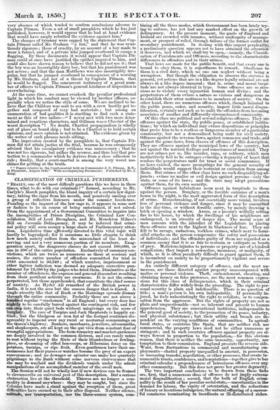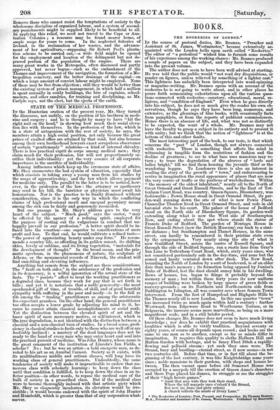CLASSIFICATION OF CRIMINAL PUNISIBERNTS.
" TheAtny, one of the most difficult questions this we have in these times, what to do with our criminals P" formed, according to Mr. Carlyle's March pamphlet, the bland inquiry of a certain law digni- tary, taking the cigar from his mouth, and pensively smiling over a group of reflective listeners under the summer beech-tree. Puzzling as the inquest of the law sage is, it appears in some sort or fashion to be in course of being entertained, if not solved. From the appointment of a Government Committee to inquire into the incongruities of Prison Discipline, the Criminal Law Con- solidation Bill of Lord Brougham, and Mr. Monekton Milues's Bill on Juvenile Delinquency, it may be inferred that crimi- nal policy will soon occupy a large share of Parliamentary atten- tion. Legislative time efficiently directed to this vital topic will hardly be begrudged; for it occasions no little chagrin to think how much society suffers from the misconduct of the least 'de- serving and not a very numerous portion of its members. Exag- geration apart, the dangerous classes do not exceed 100,000, or one in 200 of the entire population. Exclusively of summmycon- victions, which are twice as numerous as those at sessions and assizes, the entire number of offenders committed for trial in 1848 amounted to -30,349 ; of which number, imprisonment -or other lighter infliction was deemed an adequate corrective pun- ishment for 19,580 by the judges who tried them. Diminative as the number of offenders is, the expense and generaltliseomfort resulting from their pestilent activity are enormous. It is not the crimes perpetrated, but those apprehended, that constitute the chief sontoe of anxiety. As Ryder Ali remarked of the British power in India, it is not the seen but the +unseen danger that is feared. A single atrocity like that of Rush or the Maimusgs spreads dismay through the entire community. Probably 'there are not above a hundned regular " cracksmen" in all England ; but every door has nightly to be carefully barred against the contingent risk, and few -can step into their quiet beds without misgivings on the score of burglary. The race of Turpins and Jack Shepherds is happily ex- tinct; but the bludgeon or iron fist of the footpad continues dis- agreeably to impend over any rural or nocturnal communings on the -Queen's highway. Bankers, merchants, jewellers, silversmiths, and shopkeepers, are all kept on the qui viva from constant fear of wrongful appropriations. The farm-tenantry and inarket-gardene.rs are deeply involved in the common distress and can rarely retire to rest without trying the flints of their blunderbuss or fowling- piece, or dreaming of rifled hen-coops, or Hibernian foray on the potatoes, turnips, or ripe fruit. Even gentlemen have their un- easinesses lest their purses or watches become the prey of an expert conveyancer; and no dowager or spinster can nuke her -quarterly pilgrimage to the Bank without some nervous clairvoyance that she may be waylaid and the -dividends vanish under the adroit manipulations of an accomplished member of the swell mob. The Session will not be wholly lost if new devices can be framed to circumscribe an universal pest of this description. But a serious obstruction lies at the threshold. Thieves are no longer a com- modity in demand anywhere : they may be caught, but since the Colonies have made a stand against the reception of them, great difficulties have ensued as to their after disposal. Neither silence, solitude, nor transportation, nor the three-course system, corn-
SI
billing all the three modes, had Government has been lately try- ing to enforce, has yet had any marked effect on the growth of delinquency. At the present moment, the gaols of England and Ireland are crowded with inmates, without uniformity of manage- ment, or prospect of relief, through failure of -the former outlet for secondary punishment. In dealing with this urgent perplexity, a preliminary question appears not to have obtained the attention it deserves and which we shell try to open,—namely, the Classifi- cation of Punishments and Offences, according to the characteristic differences in offenders and in their crimes.
That laws are made for the public benefit, and that every one is bound to obey them it is superfluous to remark. Obedience to
them is a civil duty, -no one can neglect without being a wrongdoer. But though the obligation to observe the statutes is general, yet actions that are in a like degree legally criminal are not always in a like degree immoral ; that is, crime and moral turpi- tude are not always identical in type. Some offences are so atro- cious as to violate every injunction human and divine ; and the perpetrators of them evmee a nature so vicious and dangerous as to establish their utter unfitness to be members of society. On the other hand, there are numerous offences which, though inimical to the public peace order, and security, import little moral disqua- lification certainly not such as to unfit the offenders from becoming associate; of another and differently-circumstanced community. Of this class are political and several religious offences. They are offences against the state, the p-ablic peace, or established institu- tions; by -which an individual may evince dispositions or principles that prove him to be a restless or dangerous member of a particular community, but not a demoralized being unfit for civil society. Offences against the revenue-laws, against commerce and trade, and
st the game-laws, form classes of offences of this description. They are offences against the municipal laws of the country, but not against the natural feelings and eonsciences of mankind. They are not crimes per se, hire murder, rape, or robbery, which men instinctively feel to be outrages evincing a depravity of heart that renders the perpetrators unfit for trust or social communion. If no laws existed, the mere promptings for the general security of individuals would suggest their restraint or extrusion from among them. But crimes of the other class have no such disqualifying ad- juncts ; evince nonialice or evil design against persons—only the state, or some of its laws; and the state may adopt precautions against them, for its own security.
13ffenees against habitations seem next in turpitude to those amainst the person. Burglary, or the forcible entrance of a man's Luse in the night, is the most aggravated form of this description of crime. Housebreaking, if not essentially more venial, involves less of -personal violence and danger, since it may be committed in the day-time, or -without forcible entry, by merely drawing it latch or opening a window. Arson, or a person's wilfully setting Ere to his house, by which the dwellings of his neighbours are endangered, is sn atrocity of -deeper dye. The moral sense of men concurs with the interdict of the Legislature in placing these offences next to the -highest in blackness of hue. They are felt to be savage, audacious, reckless crimes, -which next to homi- cidal attacks on the person compromise the safety and possessions of individuals ; and the offenders guilty of them are regarded as a -common enemy that it is as fair to restrain or extirpate as beasts of prey. Malicious injuries to persons or property are of a kindred complexion; they import a cowardice, -meanness, or malignity, Of --cilia, as it is often peculiarly difficult to guard against them, it is incumbent on society to be proportionately vigilant and severe in the punishment. An entirely different 'category of offences, and the most nu- merous, are those directed against property unaccompanied with malice or personal violence. Theft, embezzlement, cheating, and olitaining money on false pretences, are the most common expres- sions for this class of delinquencies, which in their criminal characteristics differ widelyfrom the preceding. The right to per- sonal security is plain and indefeasible. There is no question of title; a man's person is his own indisputably. If personally in- jured, he feels -unhesitatingly the right to retaliate, or to compen- sation from the aggressor. But the rights of property are not so plain and imtmestionable—not so inherent and present to human ehension. They are conventional institutes, indispensable to e general good of society, to the-promotion of its peace, industry, and physical subeietence ; but -their utility and 'breach are de- pendent on 'the varying conditions of communities. In agr, icul- tural elates, or countries like Spain, that are neither rich nor commercial, the property laws need not 'he either numerous or stringent; and in such countries offences against property are al- -ways fewest in proportion to the population,—for this obvious reason, that there is neither the same necessity, opportunity, nor
temptation to their commission. England presen'tathe reverse side. Want, from fluctuations in commercial and manufacturing em- ployments—chattel property unequalled in amount, in possession, or unceasing transfer, negotiation, or other processes, that create in- numerable trusts, confidences, and temptations—togethersive to her criminal calendar a preponderance of Istrocineus offences over any
other community. But this does not-prow her greater depravity. The two important conclusions to be drawn from these fasts are, first, -that a numerous class of offences do not imply extreme
moral disqualification ; second, that the bulk of English crimi-
nality is the result of her peculiar social state,—uneeetainties in the demand for labour, the vanity of ostentation, and the seductions of luxury or licentious indidgenee, the natural offspring of a success- ful commerce terminating in inordinate or ill-distributed riches.
• .1 I
Remove those who cannot resist the temptations of society to the wholesome discipline of organized labour, and a system of second- ary punishments might be supplied likely to be beneficial to all. In applying this relief, we need not travel to the Cape or Aus- tralian Colonies ; a resource may be found ,nearer home, of ample scope for years to come. in the neglected fisheries of
i
Ireland, n the reclamation of her wastes and the advance- ment of her agriculture,—supposing Sir :Robert Peel's planta- tion scheme to be carried out,—a wide field might be opened for the employment and location of the delinquent but not de- praved portion of the population of the empire. There are many great works in the Metropolis, often discussed and partly approved, but never begun—such as the embankment of the
and improvement of the navigation the formation of a Me- tropolitan cemetery, and the better drainage of the capital—on which a large amount of convict labour might be employed. None of these may be free from objection ; still they would be better than i
the existing system of prison management, n which half a million is spent annually, in costly buildings the hire of captains, school-
masters, and other sundries, for training and disciplining, as Mr. Carlyle says, not the elect, but the ejecta of the earth.

























 Previous page
Previous page